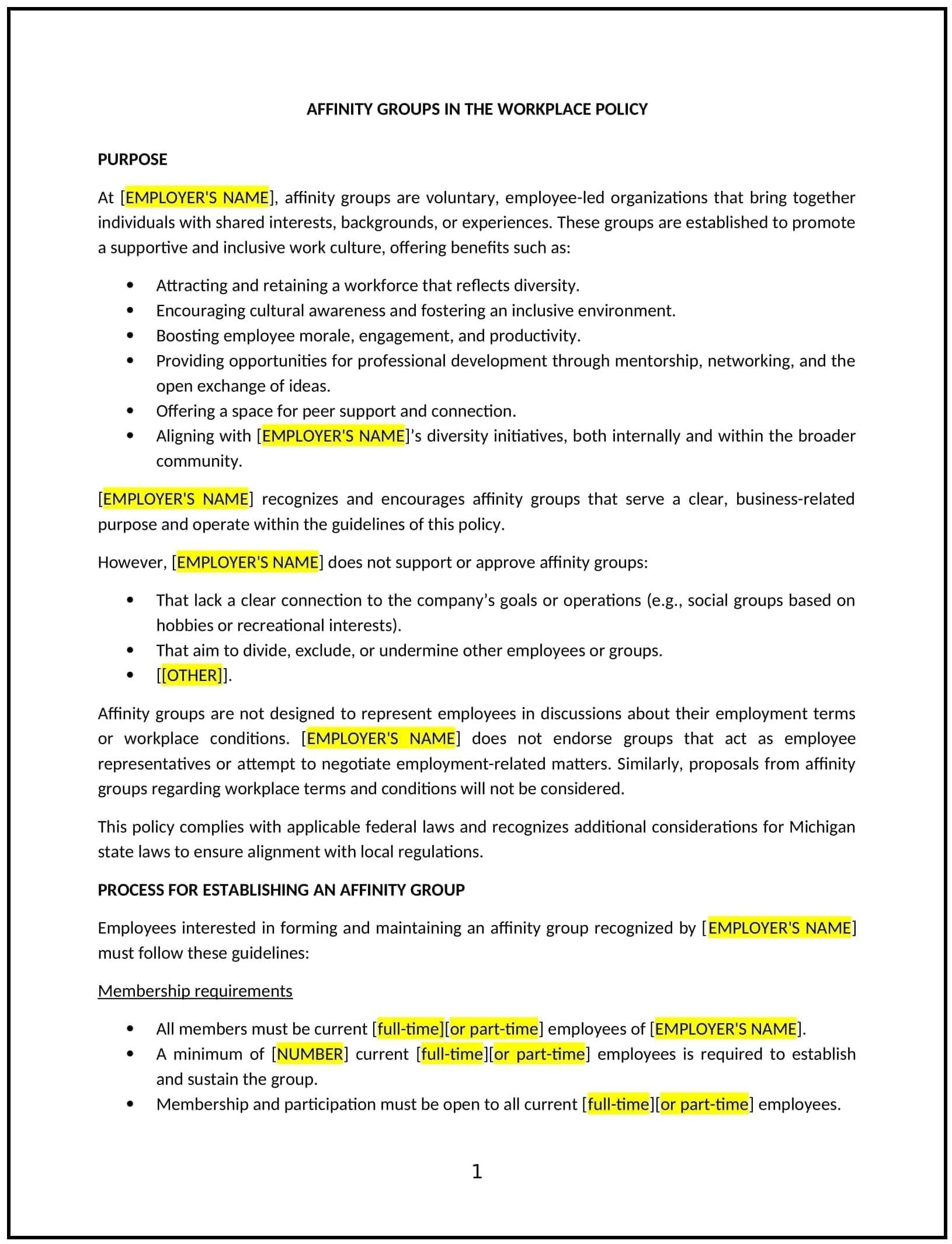Affinity groups in the workplace policy (Michigan): Free template
Got contracts to review? While you're here for policies, let Cobrief make contract review effortless—start your free review now.

Customize this template for free
Affinity groups in the workplace policy (Michigan)
An affinity groups in the workplace policy provides Michigan businesses with guidelines for supporting employee-led groups based on shared characteristics, experiences, or interests, such as gender, race, sexual orientation, or other personal identities. This policy outlines the formation, activities, and management of these groups to ensure they contribute positively to workplace culture while aligning with business goals.
By adopting this policy, businesses can foster inclusivity, promote diversity, and support employee engagement.
How to use this affinity groups in the workplace policy (Michigan)
- Define the purpose of affinity groups: Clearly outline the purpose of affinity groups, such as providing a space for employees to connect, share experiences, and support one another while promoting diversity and inclusion.
- Set guidelines for group formation: Specify the requirements for creating an affinity group, including the minimum number of employees, approval process, and alignment with company values.
- Ensure inclusivity: Emphasize that affinity groups should be open to all employees, regardless of whether they belong to the specific identity group being represented, to encourage diversity of thought and experience.
- Outline group activities: Specify the types of activities that affinity groups are encouraged to organize, such as educational sessions, networking events, or social initiatives that align with business goals.
- Establish communication protocols: Provide guidelines for how affinity groups should communicate their activities to the wider organization and ensure their initiatives support business objectives.
- Clarify the role of leadership: Define the role of leadership in supporting affinity groups, including providing resources or mentorship when necessary.
- Monitor and evaluate the impact: Establish processes for monitoring the effectiveness of affinity groups and their contribution to workplace culture and business goals.
Benefits of using this affinity groups in the workplace policy (Michigan)
This policy provides several key benefits for Michigan businesses:
- Promotes inclusivity and diversity: Affinity groups encourage employees from diverse backgrounds to connect and share their experiences, fostering a more inclusive environment.
- Enhances employee engagement: By supporting affinity groups, businesses provide employees with opportunities to network, build relationships, and develop professionally, which boosts engagement.
- Improves retention and recruitment: A commitment to diversity and inclusion can attract and retain top talent from various backgrounds, making employees feel valued and supported.
- Strengthens company culture: Affinity groups promote open dialogue, mutual respect, and the celebration of differences, enhancing team cohesion and communication.
- Supports professional development: Affinity groups offer employees opportunities for leadership development, skill-building, and networking, contributing to personal and professional growth.
Tips for using this affinity groups in the workplace policy (Michigan)
- Communicate the policy: Make sure all employees understand the purpose of affinity groups and the process for forming or joining a group through onboarding and internal communications.
- Provide resources: Ensure that affinity groups have the resources they need to succeed, such as meeting spaces, funding for activities, or access to leadership for support and guidance.
- Foster an inclusive environment: Encourage employees to participate in or support affinity groups, ensuring that participation is voluntary and welcoming to all.
- Monitor group activities: Regularly review the activities of affinity groups to ensure they align with company values and business objectives.
- Review regularly: Update the policy periodically to ensure it remains aligned with Michigan laws, workplace needs, and best practices for fostering diversity and inclusion.